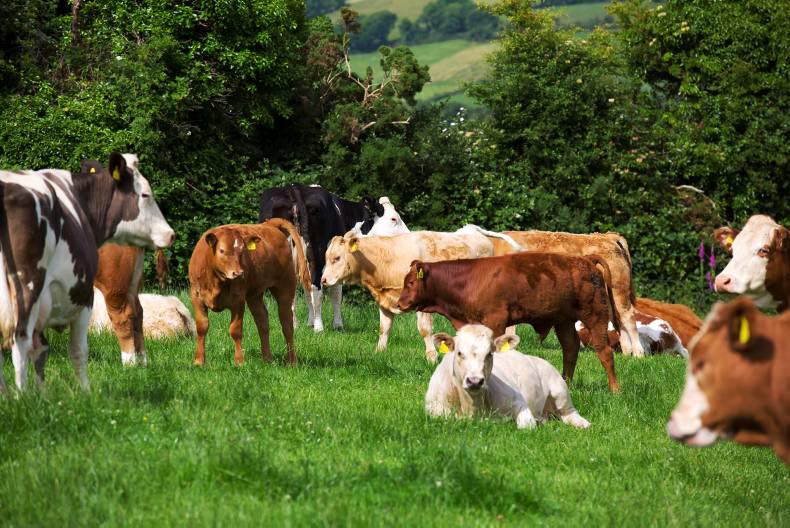When I got out of the jeep in the field I was greeted by the sound of harsh, deep lung coughing from the batch of calves. I examined one sick calf that had no temperature but severe respiratory symptoms and great difficultly breathing.
We stopped and listened, watching the other calves. We then discovered another calf with open mouth breathing. These calves had been in this field for the last seven weeks and there was no history of severe pneumonia issues in the past. I treated the two calves and suggested all the calves receive a levamisole wormer as well. They had received no previous worming.
I also took three dung samples to check for lungworm larvae. My provisional diagnosis was lungworm (dictyocaulus viviparous) based mainly on the symptoms and type of cough. I have no doubt there was secondary bacterial pneumonia also affecting the sick calves.
Parasite control
I have always found lungworm difficult to predict when drawing up parasite control plans. Often older cattle can be the source as they can carry some worms over winter and shed eggs. These eggs develop into larvae if conditions are right.
We see lungworm issues when temperatures are high, and in wet weather also which allows larvae to swim on to grass from dung. When ingested, these larvae penetrate the gut wall and end up making their way to the lungs where they grow into adult lungworm. These then produce eggs which are coughed up and swallowed and passed out in the dung.
In the last two to three weeks I have seen conditions which are perfect for lungworm larvae spread and infection. It is still early days but I would suggest that farmers are aware and watching for lungworm symptoms. Lungworm is unpredictable, and sometimes I suggest also monitoring weather conditions and grazing patterns that would suit the parasite.
It is also worth remembering that presumptions are dangerous and many diseases can make cattle cough. From now on, however, with the right conditions, cattle coughing especially when being moved should be considered for lungworm.
Medicine
Your own vet is best placed to advise on specific doses, but usually when I am suspicious of lungworm I recommend a white or yellow drench. Grazing patterns can increase or decrease risk so also look at this. In young cattle, dung sampling can be an effective way of confirming a diagnosis. However, in adult cows it can be more difficult due to reinfection syndrome.
Reinfection syndrome is where cows get reinfected by lungworm due to immunity in the lungs, where the lungworm does not develop into adult parasites. You get the symptoms of lungworm but no signs of larvae in the dung. This is quite a complicated condition and one to discuss with your own vet if you are suspicious of coughing in grazing cows.
Read more
Vet's corner: lameness in dairy cows
When I got out of the jeep in the field I was greeted by the sound of harsh, deep lung coughing from the batch of calves. I examined one sick calf that had no temperature but severe respiratory symptoms and great difficultly breathing.
We stopped and listened, watching the other calves. We then discovered another calf with open mouth breathing. These calves had been in this field for the last seven weeks and there was no history of severe pneumonia issues in the past. I treated the two calves and suggested all the calves receive a levamisole wormer as well. They had received no previous worming.
I also took three dung samples to check for lungworm larvae. My provisional diagnosis was lungworm (dictyocaulus viviparous) based mainly on the symptoms and type of cough. I have no doubt there was secondary bacterial pneumonia also affecting the sick calves.
Parasite control
I have always found lungworm difficult to predict when drawing up parasite control plans. Often older cattle can be the source as they can carry some worms over winter and shed eggs. These eggs develop into larvae if conditions are right.
We see lungworm issues when temperatures are high, and in wet weather also which allows larvae to swim on to grass from dung. When ingested, these larvae penetrate the gut wall and end up making their way to the lungs where they grow into adult lungworm. These then produce eggs which are coughed up and swallowed and passed out in the dung.
In the last two to three weeks I have seen conditions which are perfect for lungworm larvae spread and infection. It is still early days but I would suggest that farmers are aware and watching for lungworm symptoms. Lungworm is unpredictable, and sometimes I suggest also monitoring weather conditions and grazing patterns that would suit the parasite.
It is also worth remembering that presumptions are dangerous and many diseases can make cattle cough. From now on, however, with the right conditions, cattle coughing especially when being moved should be considered for lungworm.
Medicine
Your own vet is best placed to advise on specific doses, but usually when I am suspicious of lungworm I recommend a white or yellow drench. Grazing patterns can increase or decrease risk so also look at this. In young cattle, dung sampling can be an effective way of confirming a diagnosis. However, in adult cows it can be more difficult due to reinfection syndrome.
Reinfection syndrome is where cows get reinfected by lungworm due to immunity in the lungs, where the lungworm does not develop into adult parasites. You get the symptoms of lungworm but no signs of larvae in the dung. This is quite a complicated condition and one to discuss with your own vet if you are suspicious of coughing in grazing cows.
Read more
Vet's corner: lameness in dairy cows






 This is a subscriber-only article
This is a subscriber-only article









SHARING OPTIONS: